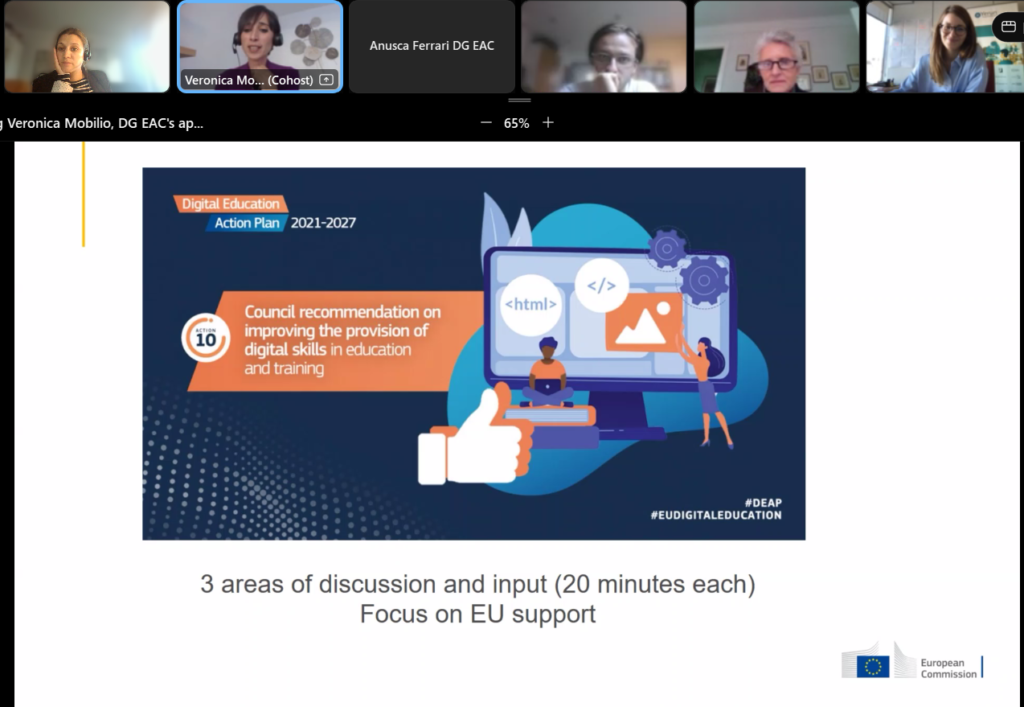EARLALL participated in the European Commission’s Stakeholders Consultation on Digital Skills
24/10/2022

On 21 October 2022, the European Commission invited EARLALL to participate in the Stakeholders’ Consultation on the proposals for Council Recommendations on digital education and skills.
The online participatory workshop aimed to discuss the Council Recommendation Proposals on 1) Enabling Factors for Digital Education and 2) Improving the Provision of Digital Skills in Education and Training, in the context of the Digital Education Action Plan 2021-2027.
Georgi Dimitrov, Head of the ‘Digital Education’ Unit, Directorate-General for Education, Youth, Sport and Culture (DG EAC), European Commission, opened the workshop by introducing the context of the consultation. The European Commission is currently working to facilitate the digital and green transition by carrying out parallel and interconnected policy initiatives. In the education area, one of the most relevant ones is the Digital Education Action Plan 2021-2027 which is looking into both directions and connects also with the recovery and resilience initiatives launched by the European Commission after the pandemic.
Mr Dimitrov explained that the Council presented two different proposals on digital skills as both are different but complement each other. On the one hand, the proposal on “Enabling Factors for Digital Education” is focused on scalable solutions while the proposal on “Improving the Provision of Digital Skills in Education and Training” is focused on how to support with tools the provision of digital skills at the national level.
To inspire the participants, Mr Paulo Santiago, Head of the Policy Advice and Implementation Division, Directorate for Education and Skills, OECD, was invited to give an overview of the key challenges of the “Enabling factors for digital education and skills”. He pointed out that, based on OECD research and data, there is potential for digital skills, but not all countries are gripping. Mr Santiago recommended five enabling factors for effective, equitable and efficient digital education: digital structures, learning infrastructures, institutional and human infrastructures, policy infrastructures, and monitoring and evaluation infrastructures.
Participatory workshops
EARLALL participated in the discussion about the Council recommendations on improving the provision of digital skills in education and training facilitated by Veronica Mobilio, Policy Officer, ‘Digital Education’ Unit, Directorate-General for Education, Youth, Sport and Culture (DG EAC), European Commission. The scope of this proposal is to address formal education and training, focusing on investment, capacity building and successful use of digital technologies to enhance teaching and learning. The focus in this group was in three areas strengthening the curriculum and learning offer at all levels, recruiting and training specialised teachers and Assessment, certification, recognition of skills. The work on this proposal is carried out in close cooperation with the European Commission DGs for Employment, Social Affairs & Inclusion and for Communications Networks, Content and Technology.
Next steps
- Upcoming stakeholder consultations in 2022
- Peer-learning activity on enabling factors with DELTA WG (October 2022)
- Panel discussion on provision of digital skills at the European Education Summit (December 2022)
- Adoption of both CR proposals by the European Commission 1Q 2023
- Council Recommendation
- Staff Working Document Document




